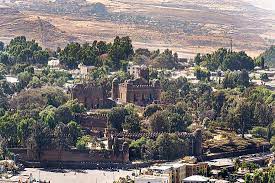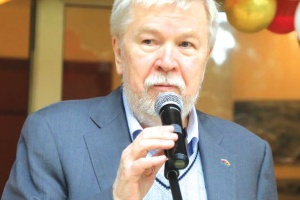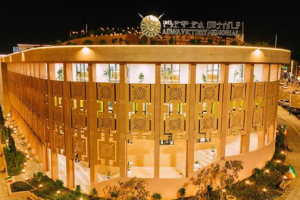
BY MULUGETA GUDETA
The northern Ethiopian city of Gondar is recently undergoing a resurgence following the recent celebrations of both Genna or Christmas and Timkat or the baptism of Jesus Christ in the hands of the John the Baptist an event sometimes referred to as Ethiopian Epiphany. The resurgence of Gondar city assumed a particular importance as the historic city shook of the shackles of two years of conflict and returned to its old self as one of the cradles of Ethiopian history.
What is also striking about my discovery of the British writer who has produced a long historical novel out of the famed historical city of Gondar, came with my painful realization that Ethiopian history or Ethiopia’s story, was mainly being written by foreigners and mainly by the British while we are still the passive recipients of the literary productions thrown at us from here and there.
To be frank, foreign authors have contributed a great deal to the popularization of Ethiopian history than Ethiopian historians, with the exception of Professor Emeritus Bahru Zewede who gave us important and uncontroversial works based on more recent Ethiopian history. Notable among these books are A History of Modern Ethiopia 1855-1991, Pioneers of Change in Ethiopia and The Quest for Socialist Utopia. The student Movement 1960-1974, among others.
Ethiopian scholarship on the other hand has not yet awoken from its long slumber to either critically review or comment on books written by foreigners or have not yet produced the books themselves.
There is a 1986 historical novel about Gondar written by a little known British author called Nicholas Louard. The book is simply entitled “Gondar” and is a long read of more than 600 pages. According to the description of the book, Gondar is “an exotic fantastic story of the struggle for control of the fabled 19th century Abyssinian kingdom. Richly created and lushly told, it is peopled with unforgettable characters both real and imaginary set in an Africa of violence spectacle and romance.”
According to the same source, the author Nicholas Louard is a well-known author, some of his books are a fascination for readers like in the Gondar book, and this is one of the most wanted Nicholas Louard author readers around the world. Personally I saw the book many years back but did not have the opportunity to read it for some reason. The book is available for sale on line but is largely unknown in this country. I have never encountered anyone who said they know or read the book as we Ethiopians are not fans of foreign authors even if they write about us.
Anyway, judging by the length of the book and the reputation of its author, my guess is that it must be a very interesting read judging by the sheer description of the book by its blurb as exotic and fantastic story of the struggle for the control of 19th century Gondar. My purpose here is not of course to review the book because I have never put my hand on it yet but to indicate my impression about the subject of the book because of the central place where the history of Ethiopia has been shaped by the struggle to control of the kingdom which has a contemporary relevance as the struggle for control of Gondar was repeated more recently, giving us the impression that how much Ethiopian history has not changed.
There are also other books and treatises written about Gondar by Ethiopian researchers or historians. I have also come across another book called, “History of the City of Gondar” by Solomon Getahun and reviewed by a certain Sereke Berhan in “African World Press” in 2005. A partial excerpt of the review reads as follows:
“The establishment of the historical city of Gondar in northern Ethiopia around 1636 signaled the end of the medieval tradition of roving capitals. Emperor Fasiladas may have chosen Gondar as his seat of government for its strategic placement and fertile lands. More significantly, in the relative peace of 17th century northern and central Ethiopia, caravans from Sudan and the Red Sea converged on and dispersed from Gondar.”
The city of Gondar is strategic now as it used to be in those distant centuries both as a trade center and a place of interest for people who come from the north as well as the west. Gondar is of course famed for its ancient castles and historic churches that have now become Ethiopian heritages. At present Gondar is also recognized as one of the most important tourist attractions in the country because of its long history and the amazing architectural works of Ethiopians from those remote times.
Gondar is always in the news, either during times of war and time of peace. Barely emerging from the devastating consequences of a two-year conflict, Gondar is once again claiming the headlines as a city leaving its recent past behind and indulging in its ages-old religious practice of celebrating both Ethiopian Christmas and Timkat or the celebration of the baptism of Jesus Christ by Jhon the Baptist in the River Jordan.
According to media reports coming from Gondar last week, residents of Gondar have been making the necessary preparations to welcome domestic and foreign visitors and show the world that their city has emerged from difficult times without its history and vision unscathed. The compassion and hospitality of the residents was most evident as they welcomed visitors who came to the city for Timkat and Christmas before it by giving them shelters in their own compounds, providing them with what they eat and drink as well as other accommodations.
According to the same reports, peace has fully returned to the city and the residents were enjoying the newly found hope of better’s days despite the sufferings of the recent past. The streets were full of people and youngsters who like their brothers and sisters here in Addis Ababa, were busy preparing the historic city both on the even and the actual days of the celebrations. The tourist flows to Gondar might not have reached its pre-war level but with lasting peace and stability, the city is slate for quick recovery as incomes from tourism would start to rise. Like any town in the region, Gondar too has endured its share of upheavals but what counts now is the everything is going to return to normal.
Given future opportunities, it is up to the tourism authorities in the region and Gondar city to be more creative in promoting its resources and attracting more visitors in the coming few weeks and months. COVID-19 and the absence of peace will soon recede into the past so that Gondar would assume it’s never fading charms and become one of the tourism pearls of north Ethiopia, alongside Axum and Lalibela.
If only Nicholas Louard could visit present day Gondar with all its hopes and energy and its people determined to reclaim the old Grandeur of a their historic city. The writer would find a new inspiration to write yet another book about the revitalization of this glorious city and its people and the brighter future it is facing. The plot line of a new book about Gondar would include the people’s optimism, compassion and resilience that would serve as powerful ingredient that would push the plot forward as Ethiopia as a whole is an impressive story that is not yet fully told.
The Ethiopian Herald 28 January 2023




